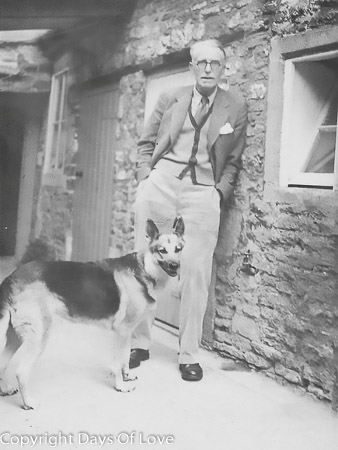

Queer Places:
4 Warmington Rd, Herne Hill, London SE24 9LA, Regno Unito
Apsley House, 106 Queen's Rd, Richmond TW10 6HN, Regno Unito
Grafton House, 89 Mount Ararat Rd, Richmond TW10, Regno Unito
Blenheim House, 76 Richmond Hill, Richmond TW10 6BG, Regno Unito
Rossall School, Broadway, Fleetwood FY7 8JW, Regno Unito
11 Half Moon St, Mayfair, London W1J 7BH, Regno Unito
76 Charlotte St, Fitzrovia, London W1T, Regno Unito
6 Hammersmith Terrace, London W6 9TS, Regno Unito
Star and Garter Mansions, 6 Lower Richmond Rd, London SW15 1EL, Regno Unito
Putney Vale Cemetery, Stag Ln, Wimbledon, London SW15 3DZ, Regno Unito
 Joe
Randolph "J. R." Ackerley[1]
(4 November 1896 – 4 June 1967) was a British writer and editor. Captain Jim
Conrad, the central figure in Ackerley's play The Prisoners of War, is a
self-portrait, as is Frank in his novel We Think The World of You.
Joe
Randolph "J. R." Ackerley[1]
(4 November 1896 – 4 June 1967) was a British writer and editor. Captain Jim
Conrad, the central figure in Ackerley's play The Prisoners of War, is a
self-portrait, as is Frank in his novel We Think The World of You.
Starting with the BBC the year after its founding in 1927, Ackerley was promoted to literary editor of The Listener, its weekly magazine, where he served for more than two decades. He published many emerging poets and writers who became influential in Great Britain. He was openly homosexual, a rarity in his time when homosexuality was forbidden by law and socially ostracized.
Ackerley's extramarital half-sister was Sally Grosvenor, Duchess of Westminster.
Ackerly was openly homosexual after his parents' deaths, having realized his homosexuality while interned in Switzerland during World War I.[16] Ackerley plumbed his sexuality in his writings. He belonged to a circle of notable literary homosexuals who flouted convention, specifically the homophobia that kept gay men in the closet or exposed openly gay men to legal prosecution.[17]
While never finding the "Ideal Friend" he wrote of so often (at least in human form), he had a number of long-term relationships. Ackerley was a "twank," a term used by sailors and guardsmen to describe a man who paid for their sexual services. He described the ritual of picking up and entertaining a young guardsman, sailor or labourer. Forster warned him, "Joe, you must give up looking for gold in coal mines."[18]
His memoir serves as a guide to the sexuality of a gay man of Ackerley's generation. W. H. Auden, in his review of My Father and Myself, speculates that Ackerley enjoyed the "brotherly"[19] sexual act of mutual masturbation rather than penetration. Ackerley described himself as "quite impenetrable."[20]
Apsley House, 106 Queen's Rd, Richmond
A few years after WWI, in 1925, J. R. Ackerley succeeded in staging his play, The Prisoners of War, set during World War I, at the Lyric, Hammersmith. Censors failed to identify the homosexual theme of the play, which focused on Captain Conrad, a prisoner of war who is attracted to the handsome young Lieutenant Grayle. Ackerley’s drama was a critical and commercial success.
From 1943, Ackerley lived in a small flat at Putney overlooking the Thames. Almost all his significant work was produced during this period. He had a stable job at the BBC and ended the unsatisfying promiscuity of his younger years. What remained was his search for what he called an "Ideal Friend".
Ackerley took financial responsibility for his sister Nancy, who was unstable, and his aging Aunt Bunny. In 1946 (the year his mother died) he acquired an Alsatian named Queenie, a dog that became his primary companion of the next 15 years. These were his most productive years, when he revised Hindoo Holiday (1952), completed My Dog Tulip (1956) and his novel, We Think the World of You (1960), and worked on drafts of My Father and Myself.
Ackerley left the BBC in 1959. He visited Japan in 1960 to see his friend Francis King; he was very taken with the beauty of the scenery and even more with Japanese men.
On 30 October 1961 Queenie died. Ackerley, who had lost a brother and both parents, described it as "the saddest day of my life."[11] He said: "I would have immolated myself as a suttee when Queenie died. For no human would I ever have done such a thing, but by my love for Queenie I would have been irresistibly compelled."[12] In 1962, We Think the World of You won the W. H. Smith Literary Award, which came with a substantial cash prize, but this did little to stir him from his grief. (He thought Richard Hughes should have won, and also thought little of the award's previous recipients.[13])
In the years after Queenie's death, Ackerley worked on his memoir about his father and drank too much. His sister Nancy found him dead in his bed on the morning of 4 June 1967. Ackerley's biographer Peter Parker gives the cause of death as coronary thrombosis.[14]
Toward the end of his life, Ackerley sold 1075 letters from E.M. Forster, dating from 1922, for which he received ₤6000; as he said, it was "a sum of money which will enable Nancy and me to drink ourselves carelessly into our graves."[15] Ackerley did not live long enough to enjoy the money but, together with the royalties from his existing works as well as several published posthumously, it allowed Nancy Ackerley to live in relative comfort until her death in 1979.
My published books: